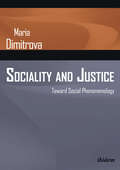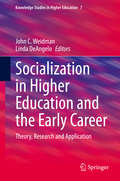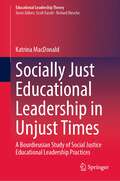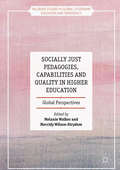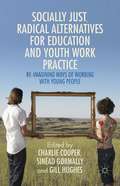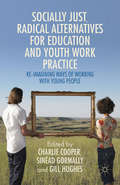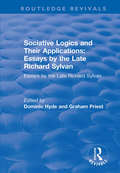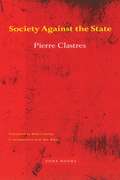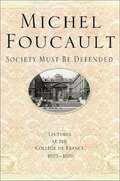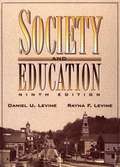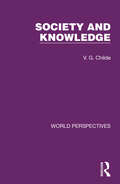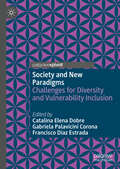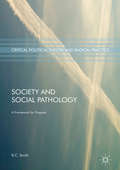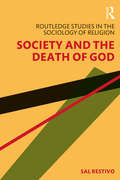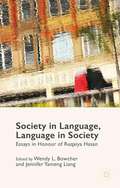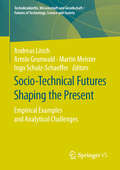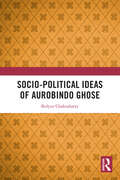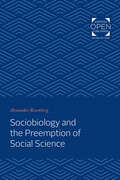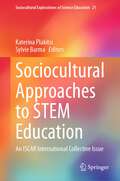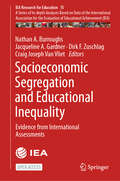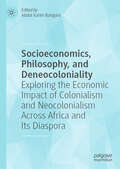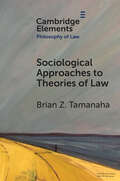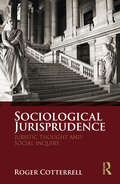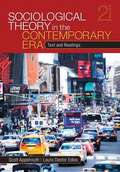- Table View
- List View
Sociality and Justice: Toward Social Phenomenology
by Maria DimitrovaBuilding on the work of Emmanuel Levinas, this groundbreaking book puts the phenomenological paradigm into a new perspective. Overcoming the focus on self-reflection of the thinking subject and instead arguing for the importance of sociality as responsibility for the Other, this new approach is based on inter-subjectivity and introduces a social dimension in phenomenology. This also allows for a different interpretation of the notion of justice, which in this context sits in the space between the one, the other, and the third before settling into any relation to the law. In the vast area inhabited by more or less distant others, moral responsibility is implemented through the establishment and maintenance of just institutions.
Socialization in Higher Education and the Early Career: Theory, Research and Application (Knowledge Studies in Higher Education #7)
by John C. Weidman Linda DeAngeloThis book celebrates the contributions of John Weidman and his colleagues to the understanding of student socialization in higher education. It includes innovative chapters reflecting new approaches to higher education student socialization with respect to students of color, gender, STEM, and students in higher education systems outside the USA. Specifically, the book examines socialization between and within in a range of groups, including national, international and minority students, parents, doctoral students, early career faculty, and scholarly practitioners. The book assesses methodological approaches and suggests directions for reformulating theory and practice. Using sociological perspectives to address issues and concerns at both the undergraduate and graduate levels, the book gives renewed life to the college impact literature. It includes revisions and expansions of the original Weidman frameworks based on the synthesis of existing research with new work reflecting unique perspectives by a variety of authors. John Weidman has been an indisputable force in the study and understanding of student socialization in higher education. This new book by Weidman and his coeditor, Linda DeAngelo, represents an undeniably significant and welcomed expansion of the original “Weidman model” of student socialization. In updating and revising the original model, chapter authors give attention to various contemporary issues such as student diversity, gender differences, early career experiences, and internationalism. Whether one samples only some of the articles that constitute this book or reads all of them, the professional payoff will be substantial. Kenneth A. Feldman, Professor of Sociology, Stony Brook University John Weidman has made a number of groundbreaking contributions to our understanding of student socialization in postsecondary education. This book, edited with Linda DeAngelo, brings together a group of fine scholars whose contributions will push our understanding even further. It is a significant addition to the college impact literature. Ernest T. Pascarella, Petersen Chair in Higher Education, University of Iowa
Socially Just Educational Leadership in Unjust Times: A Bourdieusian Study of Social Justice Educational Leadership Practices (Educational Leadership Theory)
by Katrina MacDonaldThis book offers a richly observed study of three principals working in some of the most disadvantaged primary schools in Victoria, Australia. It explores their social justice understandings and practices in working to improve the educational outcomes for children in their schools, through autobiography, biographical interviews, in-depth interviews and observations. The work looks into their life histories, the formation of their primary and secondary habitus, and uncovers and examines their encounters with the public education field. Drawing on Pierre Bourdieu’s theory of practice and his ‘thinking tools’, the book investigates how the principals’ understandings of social justice are shaped by the intersection of their life and work histories. This book is of interest to educational leadership scholars interested in the application of critical theory to studies of leadership. The book provides an exemplar for the application of Bourdieu’s theory of practice, and it makes a strong contribution to Bourdieusian scholarship, social justice scholarship and educational leadership scholarship.
Socially Just Pedagogies, Capabilities and Quality in Higher Education
by Melanie Walker Merridy Wilson-StrydomThis book explores the idea that teaching and learning - pedagogy - at universities is a crucial space for students' formation as ethical graduates, equipped with knowledge, skills and values to contribute to more equal societies. We know that universities across the globe do not stand apart from social and educational inequalities at multiple levels; they have the potential to reproduce or reduce social inequalities and therefore towards transformative ends. This book suggests how this could be achieved both via policy and practice around the globe
Socially Just, Radical Alternatives for Education and Youth Work Practice: Re-Imagining Ways of Working with Young People
by Charlie Cooper Sinéad Gormally Gill HughesChallenging dominant discourses in neoliberal marketized societies about working with disconnected young people, this book argues that alternative, radical approaches to formal and informal education are necessary to challenge repressive practices, and to help build a more equal, socially-just society.
Socially Just, Radical Alternatives for Education and Youth Work Practice: Re-Imagining Ways of Working with Young People
by Charlie Cooper Gill Hughes Sin�ad GormallyChallenging dominant discourses in neoliberal marketized societies about working with disconnected young people, this book argues that alternative, radical approaches to formal and informal education are necessary to challenge repressive practices, and to help build a more equal, socially-just society.
Sociative Logics and Their Applications: Essays by the Late Richard Sylvan (Routledge Revivals)
by Graham Priest Dominic HydeThis title was first published in 2003. Richard Sylvan died in 1996, he had made contributions to many areas of philosophy, such as, relevant and paraconsistent logic, Meinongianism and metaphysics and environmental ethics. One of his "trademarks" was the taking up of unpopular views and defending them. To Richard Sylvan ideas were important, wether they were his or not. This is a book of ideas, based on a collection of work found after his death, a chance for readers to see his vision of his projects. This collected works represents material drafted between 1982 and 1996, and the theme is that a small band of logics, namely pararelevant logics, offer solutions to many problems, puzzles and paradoxes in the philosophy of science.
Society Against the State: Essays in Political Anthropology
by Pierre ClastresIn this seminal, founding work of political anthropology, Pierre Clastres takes on some of the most abiding and essential questions of human civilization: What is power? What is society? How, among all the possible modes of political organization, did we come to choose the monolithic State model and its accompanying regimes of coercion? As Clastres shows, other and different regimes do indeed exist, and they existed long before ours — regimes in which power, though it manifests itself everywhere, is nonetheless noncoercive. In such societies, political culture, and cultural practices generally, are not only not submissive to the State model, but they actively avert it, rendering impossible the very conditions in which coercive power and the State could arise. How then could our own “societies of the State” ever have arisen from these rich and complex stateless societies, and why? <P><P>Clastres brilliantly and imaginatively addresses these questions, meditating on the peculiar shape and dynamics of so-called “primitive societies,” and especially on the discourses with which “civilized” (i.e., political, economic, literate) peoples have not ceased to reduce and contain them. He refutes outright the idea that the State is the ultimate and logical density of all societies. On the contrary, Clastres develops a whole alternate and always affirmative political technology based on values such as leisure, prestige, and generosity. Through individual essays he explores and deftly situates the anarchistic political and social roles of storytelling, homosexuality, jokes, ruinous gift-giving, and the torturous ritual marking of the body, placing them within an economy of power and desire very different from our own, one whose most fundamental goal is to celebrate life while rendering the rise of despotic power impossible. Though power itself is shown to be inseparable from the richest and most complex forms of social life, the State is seen as a specific but grotesque aberration peculiar only to certain societies, not least of which is our own.Not for sale in the U.K. and British Commonwealth, South Africa, Burma, Jordan, and Iraq.
Society Must Be Defended: Lectures At The College De France, 1975-76
by Michel Foucault David MaceyAn examination of relations between war and politics From 1971 until his death in 1984, Michel Foucault taught at the Collège de France, perhaps the most prestigious intellectual institution in Europe. Each year, in a series of 12 public lectures, Foucault sought to explain his research of the previous year. These lectures do not reduplicate his published books, although they do have themes in common. The lectures show Foucault ranging freely and conversationally over the implications of his research. In Society Must Be Defended, Foucault deals with the emergence in the early 17th century of a new understanding of society and its relation to war. War was now seen as the permanent basis of all institutions of power, a hidden presence within society that could be deciphered by an historical analysis. Tracing this development, Foucault outlines a genealogy of power/knowledge that was to become a primary concern in his final years.
Society and Education
by Daniel U. Levine Rayna F. LevineThe Ninth Edition of Society and Education continues its tradition of incorporating forward-looking material. Reflecting both recent developments and long-range trends involving the relationships between education and other social institutions, it continues to provide a balanced treatment of controversial issues — in sufficient depth to help readers understand complicated and important topics to current and future teachers and administrators.
Society and Knowledge (World Perspectives #3)
by V. G. ChildeOriginally published in 1956, the well-known archaeologist here takes on the role of philosopher. The author argues that knowledge is a social phenomenon, and that our intellectual life is the product of social heritage: reality is the product of different opinions of various societies.
Society and New Paradigms: Challenges for Diversity and Vulnerability Inclusion
by Francisco Díaz Estrada Catalina Elena Dobre Gabriela Palavicini CoronaThis book explores new societal paradigms related to current debates and discusses how we can confront aspects of those debates which do not fit into a traditional social model. It proposes a theoretical and reflective framework for understanding new social discourse, particularly related to issues of diversity, feminism, and liminal societies. The goal is to explore such issues via humanities-centered lens, rather than just sociological or psychological. Furthermore, the book adheres to the responsibility to generate a way of thinking related to a "new" way of manifesting for our society and generating a culture for the future.
Society and Social Pathology: A Framework for Progress (Critical Political Theory and Radical Practice)
by R. C. SmithThis book offers one of the most comprehensive studies of social pathology to date, following a cross-disciplinary and methodologically innovative approach. It is written for anyone concerned with understanding current social conditions, individual health, and how we might begin to collectively conceive of a more reconciled postcapitalist world.Drawing reference from the most up-to-date studies, Smith crosses disciplinary boundaries from cognitive science and anthropology to critical theory, systems theory and psychology. Opening with an empirical account of numerous interlinked carises from mental health to the physiological effects of environmental pollution, Smith argues that mainstream sociological theories of pathology are deeply inadequate. Smith introduces an alternative critical conception of pathology that drills to the core of how and why society is deeply ailing. The book concludes with a detailed account of why a progressive and critical vision of social change requires a “holistic view” of individual and societal transformation. Such a view is grounded in the awareness that a sustainable transition to postcapitalism is ultimately a many-sided (social, individual, and structural) healing process.
Society and the Death of God (Routledge Studies in the Sociology of Religion)
by Sal RestivoThis book advances the "strong" programme that sociology and anthropology provide a scientific foundation for arguing that God and the gods are human creations. Contending that religion is one – but not the only – way to systematize and institutionalize the moral order of a society, the author argues that religion reflects the fundamental human need for belonging and the social function of compassion. As such, our transcendental and supernatural ideas are really concerned with our everyday lives in communities and, faced with the severity and immediacy of the global problems with which the world is confronted – existential threats – it is increasingly important to abandon delusions and correct our mistake in reference, not by eradicating religion, but by grounding it more explicitly in earthly matters of community, social solidarity, belonging, and compassion. A wide-ranging study of the roots, nature, and purpose of religion and theistic belief, Society and the Death of God will appeal to sociologists, social theorists, and philosophers with interests in the scientific study of religion and the role of religion in the life of humankind.
Society in Language, Language in Society: Essays in Honour of Ruqaiya Hasan
by Wendy L. Bowcher Jennifer Yameng LiangThis collection of original articles covers a range of research connecting with the work of the eminent linguist Ruqaiya Hasan. It contains contributions from M.A.K. Halliday, G. Williams, D. Butt, D. Miller and M. Berry among others, an interview with Ruqaiya Hasan, and notes from the contributors about their connection with Ruqaiya Hasan's work.
Socio-Technical Futures Shaping the Present: Empirical Examples and Analytical Challenges (Technikzukünfte, Wissenschaft und Gesellschaft / Futures of Technology, Science and Society)
by Armin Grunwald Ingo Schulz-Schaeffer Andreas Lösch Martin MeisterThe exploration of ways to conceptualize the shaping of the present by socio‐technical futures is the aim of this volume. Therefore it brings together contributions from Science and Technology Studies and Technology Assessment, which focus all on the question how socio-technical images of the future shape present processes of innovation and transformation starting from empirical case studies and generalizing specific findings or by tackling conceptual questions from the outset. A white paper of 23 authors, which aims to sensitize researchers and practitioners completes the volume.
Socio-political Ideas of Aurobindo Ghose
by Bidyut ChakrabartyBy focusing on the socio-political ideas of the nationalist Aurobindo Ghosh (1872-1950), the book is an analytical dissection of his ideational vision which is still a relatively under-studied area of nationalist thoughts. During the perod, 1893-1910, Ghosh radically altered the texture of Indian nationalism by dwelling on how nationalism flourished in different parts of India, particularly, Japan, Italy and Ireland. conceptually different from the prevalent form of nationalist voice, it was he who clearly charted out a new course for anti-British campaign that fully unfolded with the appearance of Gandhi (1869-1948) on the Indian political scene. So, Aurobindo's politico-ideological vision ushered in a new era in the nationalist battle for India's political emancipation. Not only is the book therefore an intervention in the nationalist thought, but also devised new conceptual parameters for comprehending the radicalization of politico-ideological voices while simultaneously mobilizing those who were ready to make supreme sacrifices for the cause.
Socio-political Ideas of Aurobindo Ghose
by Bidyut ChakrabartyBy focusing on the socio-political ideas of the nationalist Aurobindo Ghosh (1872-1950), the book is an analytical dissection of his ideational vision which is still a relatively under-studied area of nationalist thoughts. During the perod, 1893-1910, Ghosh radically altered the texture of Indian nationalism by dwelling on how nationalism flourished in different parts of India, particularly, Japan, Italy and Ireland. conceptually different from the prevalent form of nationalist voice, it was he who clearly charted out a new course for anti-British campaign that fully unfolded with the appearance of Gandhi (1869-1948) on the Indian political scene. So, Aurobindo's politico-ideological vision ushered in a new era in the nationalist battle for India's political emancipation. Not only is the book therefore an intervention in the nationalist thought, but also devised new conceptual parameters for comprehending the radicalization of politico-ideological voices while simultaneously mobilizing those who were ready to make supreme sacrifices for the cause.
Sociobiology and the Preemption of Social Science
by Alexander RosenbergOriginally published in 1981. Why have the social sciences in general failed to produce results with the ever-increasing explanatory power and predictive strength of the natural sciences? In seeking an answer to this question, Alexander Rosenberg, a philosopher of science, plunges into the controversial discipline of sociobiology. Sociobiology, Rosenberg asserts, deals in those forces governing human behavior that traditional social science has unsuccessfully attempted to slip between: neurophysiology, on the one hand, and selective forces, on the other. Unlike previous works in the two fields it straddles, Rosenberg's book brings thinking about the nature of scientific theorizing to bear on the most traditional issues in the philosophy of social science. The author finds that the subjects of conventional social science do not reflect the operation of laws that social scientists are equipped to discover. The author argues that much of the debate surrounding sociobiology is irrelevant to the issue of its ultimate success. Although largely conceptual, the book is an unequivocal defense of this new theory in the explanation of human behavior.
Sociocultural Approaches to STEM Education: An ISCAR International Collective Issue (Sociocultural Explorations of Science Education #21)
by Katerina Plakitsi Sylvie BarmaThis book is a contribution to the sociocultural approaches to Science Technology Engineering and Mathematics (STEM) Education. It offers a new interpreting theoretical framework coming from the Cultural Historical Psychology. The authors highlight some serious elements of the sociocultural context that mediates learning on STEM or with STEM adds. The book brings together the work of researchers interested in developmental psychology and childhood, with a special focus on using Activity theory and Cultural-historical research approach to unite these two opposing approaches to the study of children. The authors reconsider our relationship and experiencing with technology. It moves the attention from the pure instrumental aspect of technology to a deep human and societal approach. Moreover, the book focuses on the issue of teachers' continuing education in both formal and informal settings is being seen under a sequential system of expansive cycles and the key role of contradictions in transformative educational settings. Overall, this book encourages the academic society to open dialogue with other societies and enhance interdisciplinary research in times of crisis.
Socioeconomic Segregation and Educational Inequality: Evidence from International Assessments (IEA Research for Education #15)
by Nathan A. Burroughs Jacqueline A. Gardner Dirk F. Zuschlag Craig Joseph Van VlietThis open access book uses multiple IEA Assessments to examine the relationship between socioeconomic segregation between classrooms and student outcomes. By examining Socioeconomic status (SES) segregation between classrooms as well as between schools, it produces a more accurate estimate of student sorting. Further, this study examines the differential impact of student sorting across subject areas and grades in order to explore whether school structure’s relationship to educational inequality exhibits content and longitudinal heterogeneity. This study employs time series, fixed-effect, random-effects, and synthetic-cohort methods to comprehensively investigate the robustness of the relationship between SES segregation and achievement inequalities. This project makes an important contribution to researchers’ understanding of student sorting’s impact using a comparative lens, while also providing important information to policymakers on the role of schools in mediating social inequalities.
Socioeconomics, Philosophy, and Deneocoloniality: Exploring the Economic Impact of Colonialism and Neocolonialism Across Africa and Its Diaspora
by Abdul Karim BanguraExisting paradigms such as &“decoloniality&” simplify the complex dynamics between former colonies and colonial powers. Such frameworks overlook the role of local elites in maintaining and even enhancing oppressive systems. They also imply that external forces are responsible for ongoing exploitation. This book tackles this concept head on by introducing a new methodology called &“deneocoloniality.&” Deoneocoloniality expands on decoloniality and neocolonialism. It argues that, while decoloniality focuses on the residual impacts of colonialism by external forces, it neglects the internal dynamics where former colonized elites play a significant role in perpetuating oppression for personal gain. The book presents socioeconomic and philosophical case studies to support deneocoloniality as a more comprehensive framework for understanding current realities in African countries. Readers will gain a nuanced understanding of the intricate power structures affecting developing nations. The book provides a structured methodology for analyzing problems, emphasizing the importance of logical reasoning and collaborative efforts. It offers practical solutions based on deep analysis, moving beyond mere diagnosis to actionable recommendations. This approach aims to equip readers with the tools needed to develop policies and strategies that address both external and internal sources of oppression.
Sociological Approaches to Theories of Law (Elements in Philosophy of Law)
by Brian Z. TamanahaSociological Approaches to Theories of Law applies empirical insights to examine theories of law proffered by analytical jurisprudents. The topics covered include artifact legal theory, law as a social construction, idealized accounts of the function of law, the dis-embeddeness of legal systems, the purported guidance function of law, the false social efficacy thesis, missteps in the quest to answer 'What is law?', and the relationship between empiricism and analytical jurisprudence. The analysis shows that on a number of central issues analytical jurisprudents assert positions inconsistent with the social reality of law. Woven throughout the text, the author presents a theoretically and empirically informed account of law as a social institution. The overarching theme is that philosophical claims about the nature of law can be tested and improved through greater empirical input.
Sociological Jurisprudence: Juristic Thought and Social Inquiry
by Roger CotterrellThis book presents a unified set of arguments about the nature of jurisprudence and its relation to the jurist’s role. It explores contemporary challenges that create a need for social scientific perspectives in jurisprudence, and it shows how sociological resources can and should be used in considering juristic issues. Its overall aim is to redefine the concept of sociological jurisprudence and outline a new agenda for this. Supporting this agenda, the book elaborates a distinctive juristic perspective that recognises law’s diversity of cultural meanings, its extending transnational reach, its responsibilities to reflect popular aspirations for justice and security, and its integrative tasks as a general resource of regulation for society as a whole and for the individuals who interact under law’s protection. Drawing on and extending the author’s previous work, the book will be essential reading for students, researchers and academics working in jurisprudence, law and society, socio-legal studies, sociology of law, and comparative legal studies.
Sociological Theory In The Contemporary Era: Text And Readings
by Scott Appelrouth Laura EdlesSociological Theory in the Contemporary Era, Second Edition, combines well-edited, important original writings from sociology′s core contemporary theorists with introductory text that provides a historical and theoretical framework for understanding them. Authors Scott Appelrouth and Laura Desfor Edles use this unique text/reader approach to introduce students to contemporary sociological theory in a lively and engaging fashion. The text/reader provides not only a biographical and theoretical summary of each theorist′s works but also an overarching scaffolding that students can use to examine, compare, and contrast each theorist′s major themes and concepts. The book also offers discussions of past social and intellectual milieus to provide a holistic picture of the development of the theories discussed.
